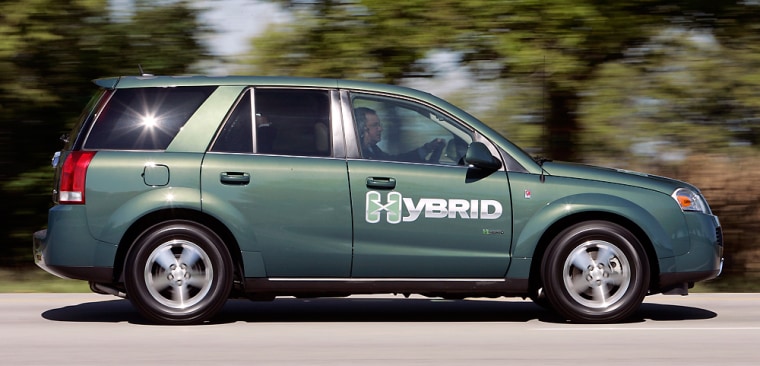When it comes to hybrid vehicles, Nissan chief executive Carlos Ghosn went out on a limb last year when he famously told a convention of car dealers that the business case for the eco-friendly vehicles had yet to be proved.
But the venerable Ghosn isn’t above a sharp about-face. In a bid to keep up with competitors, Nissan said this month it will launch a hybrid car developed for the U.S. and Japanese markets.
The change of heart for Japan’s second-largest automaker comes as U.S. automakers rush to bring out their own hybrid vehicles, hoping to capture some of the success that Japanese automakers Toyota and Honda have enjoyed over the past few years.
But with sales slipping, are hybrid vehicles losing their appeal?
In July, when gasoline prices were hovering near record highs and consumers were eager to save on fuel costs, vehicles that run on both a gas-powered engine and an electric motor peaked at an annual rate of nearly 1.5 million units, according to automotive shopping Web site Edmunds.com.
But sales of hybrid vehicles have fallen sharply since August as the price of gas has declined and Toyota has run up against a federal limit for tax credits that have helped fuel sales of the vehicles.
From September to October, sales of Toyota hybrids, including the popular Prius model, tumbled 22.4 percent — a downturn that can be attributed in large part to a quirk in federal law, according to Alex Rosten, Edmunds.com’s manger of pricing and market analysis.
Toyota had come up against the limit of 60,000 vehicles that are eligible for the full tax credit of up to $3,600 provided under a 2005 federal energy bill.
“The tax credit has played a large role, and it will expire at the end of 2007 unless Congress renews it,” Rosten said. But he added that other factors, including lower gas prices, also could reduce demand for hybrids.
“There’s certainly less buzz around hybrid vehicles — consumers are burned out on all the hybrid hoopla,” he said. “But the days of $3 for a gallon of gas are still in their minds when they shop for a car, so a hybrid is still on their list; it’s just that consumers will be less willing to pay a premium to own one.”
Rosten says there will always be a demand for hybrids from “green” consumers who want to reduce emissions and the country’s dependence on foreign oil. And car manufacturers are working to make hybrids more affordable. The Saturn Vue Green Line hybrid, for example, is one of several “value” hybrids to be introduced by General Motors over the next few years. It costs just $1,000 more than the regular Saturn Vue.
When it comes to fuel economy, some consumers have the the misconception that hybrids are superior to conventional gas-powered vehicles in all driving conditions, he said. A hybrid’s failure to meet those levels could disappoint some drivers.
“Some think a hybrid will get the stated EPA mileage returns of 50 or 60 miles per gallon all the time,” Rosten said. “But if you are using the hybrid on the highway you are using the gas engine, and cars like the Prius are much better-suited for around town driving in gridlock — they are not meant to be long-distance driving cars.”
In fact, the Environmental Protection Agency on Monday announced new testing procedures that will better reflect the way people actually drive, cutting fuel economy estimates on new-car stickers by an average of 8 to 12 percent beginning next year.
Rebecca Lindland, an automotive industry analyst at Global Insight, has studied how much consumers are likely to save with hybrid vehicles vs. their gas-only counterparts.
She concludes that a driver who buys a Honda Accord hybrid, which can cost some $3,000 more than a regular model, will need 10 to 12 years to break even in fuel savings, assuming the price of gas remains within the $2.50 to $3 range.
“To get that saving you have to drive 15,000 miles a year, and if you are driving a hybrid 15,000 miles a year, you are doing a lot of highway driving and not maximizing the best use of your vehicle,” Lindland said.
“If you are in the city and your commute is in constant stop-and-go traffic, then definitely think about a hybrid — but if your commute is on the highway and you run into very little traffic and you don’t use your brakes a lot, a hybrid won’t do you good. People generally don’t realize that braking recharges the battery,” she said. “If you’re interested in a Honda Accord or a Camry hybrid, don’t assume you will save money.”
Lindland points out that when it comes to saving money at the pump, there are alternatives to hybrids. These include engines with a highly efficient continuously variable transmission or GM’s “Active Fuel Management,” which allows a V6 or V8 engine to “turn off” cylinders under light-load conditions to improve fuel efficiency. The new GMC Acadia crossover sport utility vehicle, for example, gets a decent 26 miles per gallon on the highway and 18 in the city with a 3.6-liter V6 engine, she noted.
“The other possibility is diesel,” Lindland said. New regulations requiring low-sulfur diesel fuels, which went into effect this fall, are likely to boost the popularity of diesel vehicles in the United States. Those vehicles are already popular in Europe.
“(Diesel) has got a really bad rap because most of us think of it as loud and smelly, but this is not your father’s diesel,” she said. “Cars that run on diesel get consistently better mileage than gas engines, whether on the highway or in the city. That’s the huge advantage they have over hybrids — they are not as ‘duty-cycle’ sensitive.”
